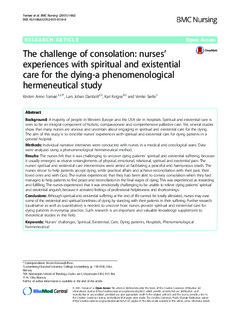The challenge of consolation: nurses’ experiences with spiritual and existential care for the dying-a phenomenological hermeneutical study
Journal article
Permanent lenke
http://hdl.handle.net/11250/2384282Utgivelsesdato
2015Metadata
Vis full innførselOriginalversjon
10.1186/s12912-015-0114-6Sammendrag
Background: A majority of people in Western Europe and the USA die in hospitals. Spiritual and existential care is
seen to be an integral component of holistic, compassionate and comprehensive palliative care. Yet, several studies
show that many nurses are anxious and uncertain about engaging in spiritual and existential care for the dying.
The aim of this study is to describe nurses’ experiences with spiritual and existential care for dying patients in a
general hospital.
Methods: Individual narrative interviews were conducted with nurses in a medical and oncological ward. Data
were analyzed using a phenomenological hermeneutical method.
Results: The nurses felt that it was challenging to uncover dying patients’ spiritual and existential suffering, because
it usually emerged as elusive entanglements of physical, emotional, relational, spiritual and existential pain. The
nurses’ spiritual and existential care interventions were aimed at facilitating a peaceful and harmonious death. The
nurses strove to help patients accept dying, settle practical affairs and achieve reconciliation with their past, their
loved ones and with God. The nurses experienced that they had been able to convey consolation when they had
managed to help patients to find peace and reconciliation in the final stages of dying. This was experienced as rewarding
and fulfilling. The nurses experienced that it was emotionally challenging to be unable to relieve dying patients’ spiritual
and existential anguish, because it activated feelings of professional helplessness and shortcomings.
Conclusions: Although spiritual and existential suffering at the end of life cannot be totally alleviated, nurses may ease
some of the existential and spiritual loneliness of dying by standing with their patients in their suffering. Further research
(qualitative as well as quantitative) is needed to uncover how nurses provide spiritual and existential care for
dying patients in everyday practice. Such research is an important and valuable knowledge supplement to
theoretical studies in this field.
Keywords: Nurses’ challenges, Spiritual, Existential, Care, Dying patients, Hospitals, Phenomenological
hermeneutical
Beskrivelse
-
